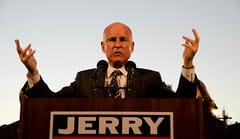Jerry Brown – Steamin’ And A-Rollin’ on the California Express

Harold Meyerson has sketched a fascinating profile of Jerry Brown in The American Prospect magazine.
But even after 6,000 words Meyerson struggles to capture both the complexity and simplicity of the man.
“There’s no living person who knows California better than Jerry Brown,” says Art Pulaski, executive secretary-treasurer of the state AFL-CIO.
Brown’s first term as Governor saw the enactment in 1978 of Proposition 13, whereby Howard Jarvis set in slow-motion a train wreck aimed to destroy the California educational system and the state’s standard-setting services.
In 1994 Brown could see that Pete Wilson’s Proposition 187 was incredibly short-sighted policy, and that the backlash against it would be strong and have long-lasting consequences for the GOP in California.
“Equal treatment for people in unequal conditions isn’t justice,” he tells me. “That’s from Felix Frankfurter, originally from Aristotle.”
After witnessing the increasing mockery of the role occupied by Wilson’s bodybuilder puppet, Brown committed and was elected Attorney General in 2006 in preparation for his second stint as Governor. By that time Brown understood there are only a finite number of tasks that the legislature can commit to enact per year.
“The most desirable laws are those that are the rarest, simplest and most general; and I even think that it would be better to have none at all than to have them in such numbers as we have.”
In 2013 it is clear that Brown knows what he is not interested in: no further tax increases, no tax on oil extraction, no change to the two-thirds requirement to pass tax increases in the future. But could a proposition be drafted that would repeal Proposition 13’s freeze on taxes on commercial property? Would Brown give such a proposition the same special treatment he produced to pass Proposition 30? Is this something that Democrats together with progressive organizations, unions and community-organizing groups could rally behind?
“He was around at the start of the anti-tax revolution,” says Michael Herald, the public-benefits advocate for the Western Center on Law and Poverty. “Maybe he’ll be around for the end of it.”
Brown has set the Californian train back on its tracks. He’s well positioned to win if he chooses to run again in 2014. His approval ratings and self-confidence are at all-time recent highs.
“I believe in California exceptionalism,” Brown says. “It’s exceptional in all the things that have changed over time and that are changing today.”
High-speed electric trains will create over 450,000 jobs for California over many years, they’ll improve the quality of life for its citizens and reduce carbon emissions for the planet. Brown is not ‘paving the way’ to move forward at the pace of an automobile, he’s laying the tracks to move forward at the speed of a bullet train.
“He’s very smart, and he understands the pulse of the people,” says Darrell Steinberg, President Pro Tem of the State Senate.
Read the full article here
The Once and Future Gov (prospect.org) with more details on healthcare, poverty and Anne Gust Brown. A great read.



